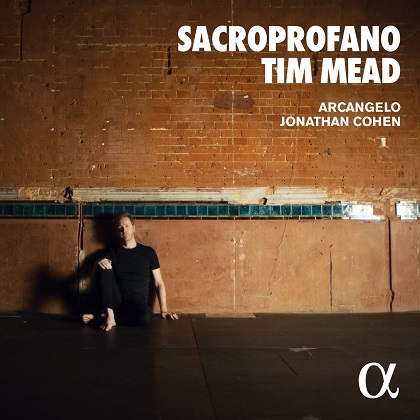On the concert platform, operatic stage and recording studio, Tim Mead has established himself as one of Britain’s foremost countertenors. This recent issue from Alpha is his first solo album and juxtaposes two closely related aspects of Vivaldi’s sacred and secular music described by the soloist in the disc’s liner notes as ‘the earthly passion of the divine and the heavenly beauty of love’. Joining Mead is Jonathan Cohen’s distinguished ensemble Arcangelo which provides excellent support and performs two purely mature instrumental works for strings alone.
While Vivaldi directed most of his creative energies towards instrumental music he made numerous contributions to liturgical music, and of his solo cantatas conceived for alto voice, four enjoy instrumental accompaniment. His accompanied solo vocal works, psalm settings and chamber cantatas have had much exposure in the recording studio, most especially Nisi Dominus (Psalm 126) and the secular cantata Cessate, omai cessate, the latter becoming staple countertenor repertoire following Andreas Scholl’s acclaimed disc with Harmonia Mundi. Alpha have already recently issued a disc featuring Nisi Dominus with the French mezzo Eva Zaïcik (2022) who provides intimacy and warmth, occasionally absent in this latest version.

That the composer’s solo vocal works here are written for a voice of considerable talent is self-evident. Whether or not they were conceived for performance at the Pietà where he was initially employed as maestro di violino is unknown, although Michael Talbot suggests Nisi Dominus may have been intended to be sung there but doesn’t commit himself over who the soloist might have been. He is clearer, if still uncertain, about the intended soloist for the two chamber cantatas Cessate, omai cessate RV684 and Amor, hai vinto, hai vinto RV683, suggesting there ‘is a possibility that both were written for his protégée and confidante Anna Girò, and their most likely place of performance was a private home such as that of the famous singer Faustina Bordoni where concerts attended by Vivaldi are known to have been held’.
From the outset of Nisi Dominus there’s no uncertainty about Tim Mead’s remarkable voice, Vivaldi’s vocal exhibitionism dispatched with élan, virtuosic passages no barrier to Mead’s copper-bottomed technique. He combines a mellifluous tone, incisive diction and an unswerving control that can dazzle the ear in the most athletic runs. Equally ear-catching is the breath control within the slow siciliano that is ‘Cum dederit’. But regardless of Vivaldi’s nocturnal evocation, this movement feels overly ponderous, lacking in atmosphere and inhabiting a certain dryness of delivery. The high tessitura in the curiously sombre ‘Gloria Patri’ (with much tender viola d’amore playing from Bojan Čičić) is dealt with admirably. Overall, the excitement lies in Vivaldi’s concerto-like movements.
Of Vivaldi’s three existing settings of the Marian antiphon Salve Regina, written during the late 1720s, two are for alto, each accompanied by two string ensembles. Variously dignified and doleful in the slower of the six movements, Mead is at his most compelling in the urgent pleas to the Virgin in ‘Ad te clamamus’ and in the equally lively ‘Eia ergo’, here coloured by two sprightly oboes making a very singular appearance. Rippling guitar figuration makes a welcome change of timbre in ‘Ad te suspiramus’, and the lilting rhythms of ‘Et Jesum’ bring evocations of Mary’s infant son.
Mead’s gift for dramatic flair is conspicuously evident in Cessate, omai cessate. Its more overt operatic manner is brilliantly showcased in the closing movement, ‘Nell’orrido albergo’, a rage aria with sudden leaps and an extended vocal range that Mead delivers with great panache. String playing is keenly alert, if without any heightened sense of fire in its collective belly. Tempi are just right and there’s some impressive decoration in the last movement’s da capo.
The major reason for acquiring this disc is Amor, hai vinto, hai vinto, where Mead brings an extra layer of intensity to its overwrought emotions. The pains of love, compared by the anonymous poet to tempestuous seas, are vividly expressed, Mead relishing the surging contours and clearly enjoying the rollercoaster vocal line in the closing movement. Throughout, Jonathan Cohen coaxes playing of exceptional refinement, the members of Arcangelo adding their own zesty involvement.
David Truslove
Tim Mead (counter tenor), Arcangelo, Jonathan Cohen (director)
Vivaldi: Nisi Dominus RV608, Ripieno Concerto for Strings in D minor RV128, Cessate, Omai Cessate RV684, Salve regina RV618, Sinfonia in B minor ‘Al Santo Sepolcro’ RV169, Amor, hai vinto, hai vinto RV683.
Alpha ALPHA914 [72:05]
ABOVE: Tim Mead (c) Andy Staples